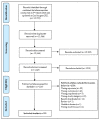Whole Dietary Patterns, Cognitive Decline and Cognitive Disorders: A Systematic Review of Prospective and Intervention Studies
- PMID: 36678204
- PMCID: PMC9865080
- DOI: 10.3390/nu15020333
Whole Dietary Patterns, Cognitive Decline and Cognitive Disorders: A Systematic Review of Prospective and Intervention Studies
Abstract
Dementia prevalence is a global public health concern. Adherence towards a healthy dietary pattern (DP) may reduce the risk of cognitive decline and dementia. This narrative systematic review aimed to synthesise prospective and intervention study data to evaluate the impact of a-posteriori and a-priori derived DPs on cognitive ageing, from cognitive decline to incident dementia. Ninety-three studies were included: 83 prospective studies and 10 randomised controlled trials (RCT). Most prospective studies (77%) examined a-priori DPs, with the Mediterranean diet examined most frequently. A total of 52% of prospective and 50% of RCTs reported a protective relationship between 'healthy' DPs and global cognitive decline. Overall, 59% of prospective studies reported positive associations between healthy DPs and risk of cognitive disorder. Incident cognitive disorder was examined by only one intervention study (subgroup analysis) which reported a beneficial effect of a low-fat diet on risk of probable dementia in women. Unhealthy DPs were examined less frequently (n = 17; 21%), with 41% of these studies reporting associations between adherence and poorer cognitive outcomes. Overall, there were mixed results for healthy and unhealthy DPs on cognition, likely due to between-study heterogeneity. Standardisation of diet exposure and cognitive outcome measurement would help to reduce this. Future research would benefit from investigating effects of culturally appropriate DPs on individual cognitive domains and incident cognitive disorders in diverse and high-risk populations.
Keywords: cognition; cognitive disorders; dementia; dietary patterns.
Conflict of interest statement
The authors declare no conflict of interest. The funders had no role in the design of the study; in the collection, analyses, or interpretation of data; in the writing of the manuscript; or in the decision to publish the results.
Figures



References
-
- Yassine H.N., Samieri C., Livingston G., Glass K., Wagner M., Tangney C., Plassman B.L., Ikram M.A., Voigt R.M., Gu Y., et al. Nutrition state of science and dementia prevention: Recommendations of the Nutrition for Dementia Prevention Working Group. Lancet Healthy Longev. 2022;3:e501–e512. doi: 10.1016/S2666-7568(22)00120-9. - DOI - PMC - PubMed
Publication types
MeSH terms
Grants and funding
LinkOut - more resources
Full Text Sources
Medical

